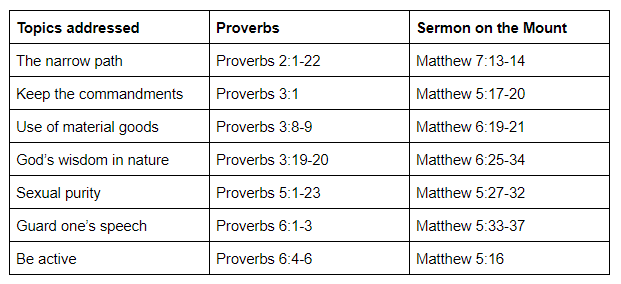|
0 Comments
When we think of the Gospels, we think of the Savior sent from God, Jesus Christ. The Gospels
reveal that God Himself came in the form of a man to save mankind from their sins. But we often overlook the "Pavior" sent from God, John the Baptist. John is the Pavior in that he paved the way for Jesus to come into the world. He is the connecting link from the Old Testament and New Testament, the first prophet to come after 400 years of revelatory silence. It may be said that to truly understand and appreciate the life of Jesus, we must first understand the role and work of John as he prepared the way for Christ.
What do you know about the book of Proverbs? If you’re like me, it can be a collection of little quotes or sayings that fit nicely on an inspirational calendar. This is, however, a far greater use for this book. The purpose of the Proverbs is to teach wisdom, the outcome of which is “justice, judgment and equity”. It takes wisdom to unravel some of the difficult sayings of the wise. Therefore, the more we understand the ways of wisdom in Proverbs, the more it will be unlocked to us to learn more. Join Jamie Thomson and me as we discuss the "Beginning of Wisdom" in Proverbs.
Why does the Bible say that God is a jealous God? After all, isn’t jealousy bad? James 3:16 says "For where jealousy and selfish ambition exist, there will be disorder and every vile practice." And yet, God also identifies as jealous. He does not do so discretely or with embarrassment…He is quite emphatic: Deuteronomy 4:24 says, "For the LORD your God is a consuming fire, a jealous God."
This is one of many Scriptures where God identifies as jealous. It may seem petty that a infinite cosmic being would be jealous of His creation. In fact, many skeptics and nonbelievers point to this attribute as their number one reason to not believe in the Bible. The seeming contradiction is that jealousy is sinful for us but okay for God. What are they missing when they form such a conclusion? In this episode, we will consider the following questions: (1) What is jealousy? (2)How can jealousy be good or righteous? (3) What is God wanting to communicate to us when He describes Himself as jealous? (4) Is there a "negative" side to the jealousy of God? (5) Does God’s jealousy help us?
Aaron Boone is back on the podcast to talk about Psalm 23. One of the most popular Scriptures in the entire Bible, Psalm 23 also holds several connections to increase our faith.
Jamie Thomson is back in the PSB studio to help us appreciate and care about the Old Testament. If you are intimidated to attempt a read through, or you have never made it through the OT, join us as we talk about why we should care about the Old Testament.
When studying the Bible, you’ll find the earliest altars, the ones that we will use as a visual in this study, were just a pile of rocks. What can we know about them?
I suggest that there are some amazing parallels to the ancient altar in the New Testament. Today, we’re specifically going to look at the parallels between the ancient altars and the family altar. This will be a slow burn, and I invite you to pay special attention as we begin with ancient altars and create parallels for our families. Let’s begin!
Murmuring can seem like such an insignificant activity, but it is a dripping water that can slowly break down rock solid faith. Join Jonathan and guest Justin Owen discuss the murmuring of the Israelites wandering int he wilderness, and how we can avoid their same troubles today.
Have you ever heard of the Biblical concept of "providence"? And if you have, is the Pharaoh's daughter the first person to come to your mind when you think of it? Join Brett Hickey (www.letthebiblespeak.com) and Jonathan Edwards discuss how providence works and how this ancient princess shows the power of God's providence.
JoinGeorge Battey and Jonathan Edwards discuss how predictive prophecy was used in the Old Testament to accomplish the will of God. Discover the seven purposed through these three episodes.
1. Predictive Prophecy distinguished the true God from false gods (Isaiah 41:21-24; 42:8-9; 48:3-5).
2. Predictive Prophecy validated true prophets (Numbers 12:6-8, Deuteronomy 18:9-13; 14-22).
3. Predictive Prophecy verified other predictions of the future (Isaiah 8:7-8 + chapters 36-37, etc.).
4. Predictive Prophecy was necessary to explain the exile to later generations (Isaiah 36:18-2-; 27:9-13; Deuteronomy 32:26-27).
5. Predictive Prophecy was necessary because deliverance takes time (Jer. 25:11, Lev. 25:1-7, 2 Ch. 36:20-21).
6. Predictive Prophecy was necessary to show that God is sovereign (Daniel 4:29-37). 7. Predictive Prophecy proved that the word of God is trustworthy (Psalm 22:30-31). |
You can listen and subscribe at the following platforms. Click on the icon below of your choice:
Categories
All
Archives
May 2024
|



 RSS Feed
RSS Feed




